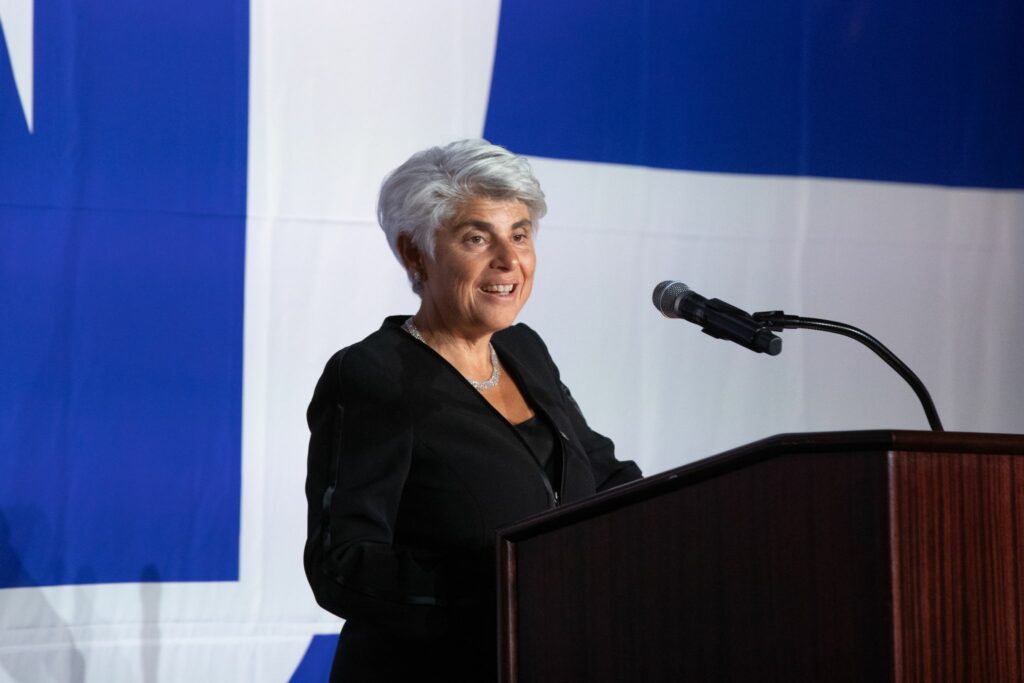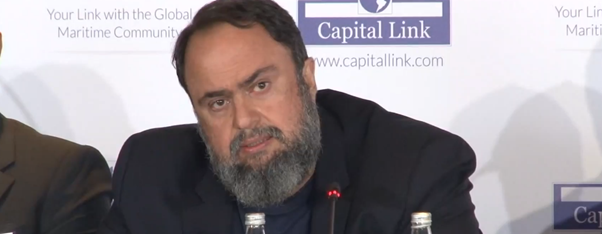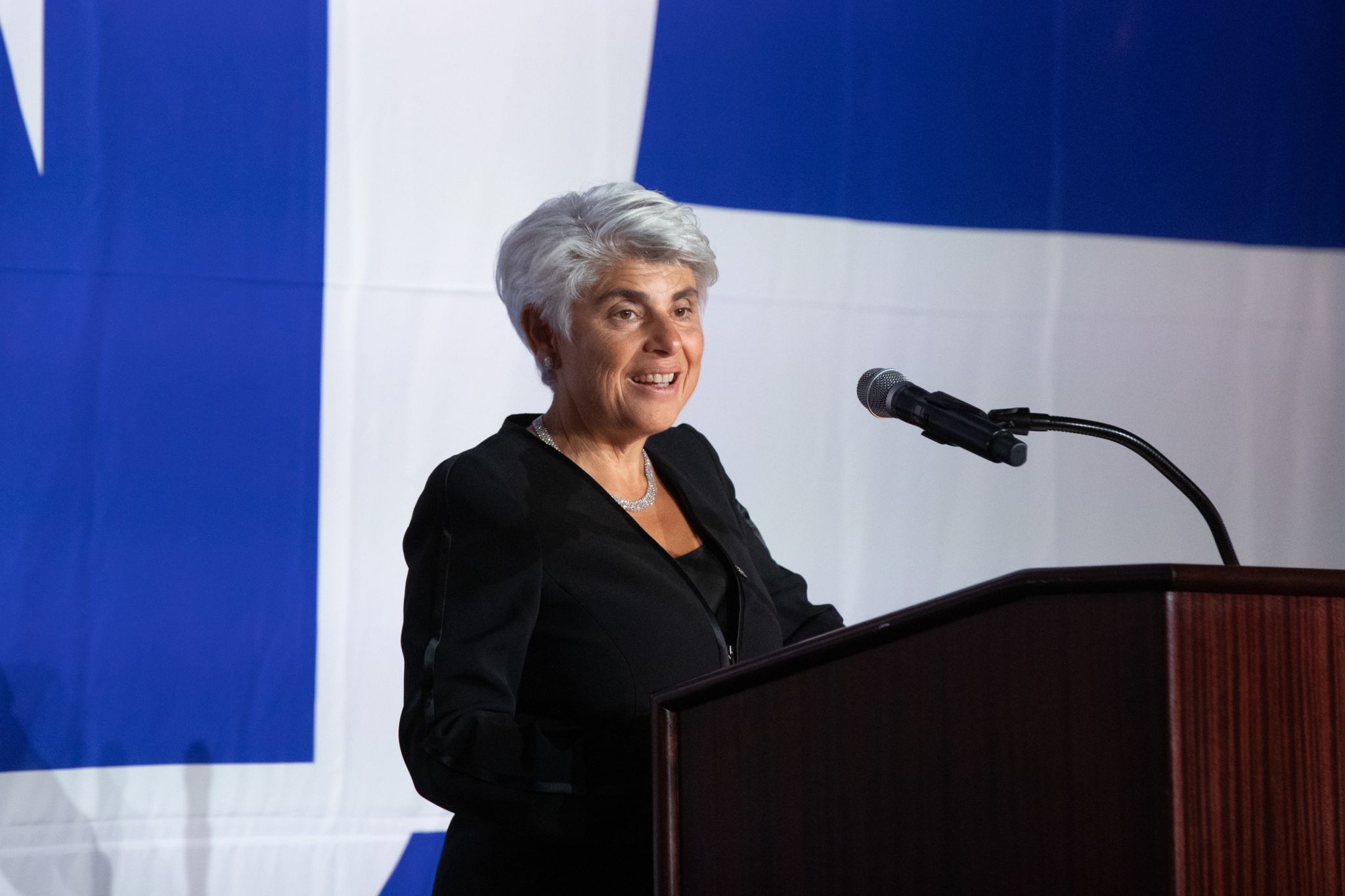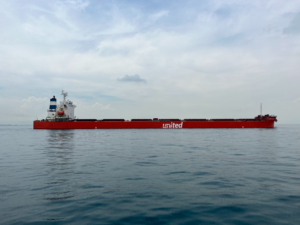
Angeliki Frangou participated in The Economist, The World Ahead 2025 Athens Gala Dinner together with the chairman and founder of Capital Maritime & Trading Corp, Evangelos Marinakis. They discussed how geopolitics, the energy transition and the global economy will transform Greece, Europe and the world in 2025.
The “big challenge for shipping in 2025 is to solve the problems,” said Angeliki Frangou, chairwoman and CEO of Navios Maritime Partners during the panel discussion.
Speaking at The Economist’s she explained, “Shipping is all about global trade. China is weak. The USA, we say, is growing, but with not a lot of flexibility because it has its debt now and its revenues are consumed by the debt service more than defense and the entitlement programs. So not a lot of room. And Europe is anemic, non-existent. The world economies have some problems with the exception of the US. But in shipping, the real question in 2025 will be how we resolve the geopolitical events that we see: the Ukrainian war, the Red Sea, the hot war with Israel and Iran, and—fundamentally–the ‘flashing topic of tariffs.”
“We also have to wonder whether the Houthis really will open the Suez Canal. What does the hot war between Iran and Israel mean for the Strait of Hormuz, through which 30% of the world’s seaborne oil passes”, Angeliki Frangou wonders.
“We are experiencing a change in global trade. And while we really searched for data, we didn’t see a really big move. I mean, that is a very natural thing when you put tariffs. You expect that there will be a frontrunning meaning that you try to buy the product before the prices rise. We haven’t seen that. What is very interesting is–and I don’t know what to make of that–that in November and December this year, China reduced its purchases for corn and wheat by 85% and 95% and soybean by 20%. To us this is a question. Are they waiting for a reason for negotiation? These are the questions we always ask ourselves,” she added.
Angeliki Frangou also underlined the importance of defense in Europe. She noted that “If we are going to spend the money, it would maybe be a wise move to use it to harmonize and modernize the defense industry. And it’s not just about tanks and old equipment. We’re talking about AI, robotics and aerial technology.”
Regarding the situation in the Red Sea and the ceasefire agreement reached between Israel and Hamas which will halt months of fighting, Angeliki Frangou stressed that “the Houthis remain a terrorist group and there are still serious risks for ships, crews and goods. At this point you need to see some certainty on this. The agreement between Israel and Hamas is very recent.”
The ceasefire brings hope in the shipping industry over the prospect of ships returning to the Red Sea, but maritime analysts are warning that the return of container ships to the Red Sea will bring chaos and collapsing freight rates.
The implications from the return of ships to the Red Sea are at the forefront of the discussions.
An agreement to pause fighting does not necessarily mean a large-scale return of ships to the Red Sea. While a ceasefire is a significant step forward, there is still a long way to go before a real peace deal is reached.
The shipping community is ready to make the change when the time is right, but it will be done in a phased way.
At this stage, “there needs to be more clarity and certainty,” Frangou noted.
From his side, Evangelos Marinakis stressed that “You cannot have agreements with terrorists. So, I think that for everybody’s interest, we need to avoid trading our vessels via the Red Sea, in order not to take unnecessary risks, and also due to insurance costs. I think that if shipowners are strong enough to insist on avoiding the passage, I think that it’s up to us to make it happen. For the Houthis, if they see that there is no target to hit, I think that this can stop sooner rather than later. But if there is normal traffic and they can have easy targets, then they achieve what they want.”

Image: Evangelos Marinakis
During the discussion Mr. Marinakis pointed out that there is a lack of leadership in Europe. “My concern is the lack of leadership in Europe with the exception of Italy which has done much better than expected.”
“When you have this lack of leadership in crucial decisions, that will affect our economies more. And of course, what has happened in the last two years plus with the Ukrainian-Russian war, with all the sanctions and what the consumers have paid for energy and increased prices for various supermarket products that we need in our daily life, this has not helped the European economies.”
“Greece is a bit different because we started from the bottom, due to the crisis. So maybe for the next couple of years, we will still see growth in our economy. And, of course, this growth also is related to tourism and to the property market around tourism. So, I am fairly optimistic about Greece, but not about Europe. Because I think that a lot of fundamental mistakes have taken place that affected the European economy.”



